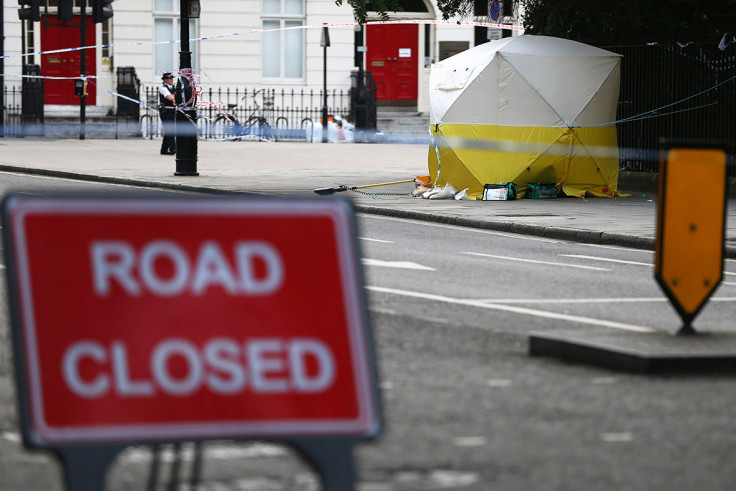Terrorism is not a symptom of mental illness
Horror and confusion following attacks must not lead us to assume that the perpetrator is mentally ill.

Early media reports of the killing in Russell Square last night once again saw mental illness linked to events described as "terror" or "terrorism", before there was clear information. This association was swiftly debunked when it became apparent that there was no suggestion of radicalism, but the underlying assumption that drove the initial stories was unfortunately unsurprising.
Much of the coverage of the recent terrorist attacks in France and Germany has included information about the perpetrators' suspected mental health. Perhaps unsurprisingly, this has prompted people to ask whether there is a causal link between mental illness and terrorism. If so, the argument goes, then this offers the chance to identify, treat – and presumably even cure - the putative 'symptom' of terrorism.
However, this is a blunt approach to take. Certainly, trying to understand organised terrorist groups such as Isis through the prism of mental disorder has rarely proved fruitful. The evidence suggests that the majority of those who belong to such groups are not mentally ill – in fact, members of organised groups are substantially less likely to have a mental illness than lone actors. This may be because many terrorist organisations are known to reject people with obvious mental health problems because of a combination of stigma, perceived unreliability and security concerns.
On the other hand, we have to accept that those who commit 'lone acts' of terrorism (or acts of murder unlinked to political ideology, such as school or workplace-based massacres) are statistically more likely to have a background of poor mental health.
Research shows that lone actors are more likely to have psychotic disorders such as schizophrenia than the general population, and also more likely to have autistic spectrum disorders. But this is by no means always the case, and there is no single pattern or diagnosis.
Members of organised groups are substantially less likely to have a mental illness than lone actors
So our horror at what are inexplicable acts must not lead us to make the automatic assumption that someone who has committed a terrorist act must be mentally unwell. This does a serious disservice to people with mental illness – who are actually more likely to be the victims of violence rather than the perpetrators – and to their friends and families.
The issues become even more complicated when we move from those known to have committed such acts to those who might. Nearly half of the people referred to the Government's Channel scheme, a voluntary assessment and referral programme for those who others consider might be at risk of radicalisation or extremism, are considered to have a mental illness or psychological vulnerability.
It is timely to draw attention to the chronic underfunding of mental health services in this context, as it has long been known that three-quarters of people with a mental disorder receive no treatment, and that the gaps are particularly evident in services for young people – exactly the age group we are discussing here. So investing more in child and adult mental health services would benefit an increasingly anxious and potentially growing population of troubled and alienated teenagers. Given the rarity of what we seek to prevent, we may never know how successful this might be in the unfortunately titled "war on terror", but it would definitely help considerable numbers of troubled adolescents and young adults.
When mental illness is a directly precipitating factor there may also be a flavour of 'radicalisation', as it can include many cultural influences such as social alienation, exclusion, disaffection and inter-familial issues. Of course, these are also far from unusual in people who do not commit dreadful crimes. So there must be a fundamental distinction between attempting to treat mental health problems in someone who might or might not be at risk of committing an extremist act and treating "terrorism", whatever that might be.
The relationship between mental illness and other crimes is complex, and methodologically sound research into contemporary terrorism is in its infancy – and not helped by the atmosphere of secrecy in which some of this research is carried out.
Psychiatrists have tried and tested expertise in treating mental illness, especially when associated with delusional or seriously abnormal beliefs, but that is a far cry from saying that they should or even could have a role in ideological deradicalisation programmes.
The relationship between mental illness and other crimes is complex, and methodologically sound research into contemporary terrorism is in its infancy – and not helped by the atmosphere of secrecy in which some of this research is carried out. So particular attention should be paid to undertaking more research in this area, ensuring that it is subject to the usual ethical safeguards, but most of all insisting that the results are available to professionals and eventually the public.
While we gather the information we need to make evidence-based recommendations about what does work, caution should be exercised in forming knee-jerk preventative strategies that see mental illness as a definitive cause, and psychological or psychiatric intervention as a definitive cure. The dangers of labelling people with mental illness as potential extremists when most probably present little risk is that one might help create just what it is that one seeks to avoid.
Professor Sir Simon Wessely, President of the Royal College of Psychiatrists
Greg Smith, policy analyst at the Royal College of Psychiatrists
© Copyright IBTimes 2025. All rights reserved.






















